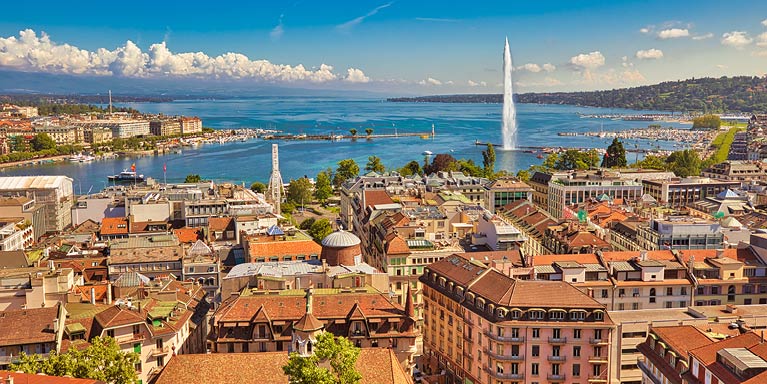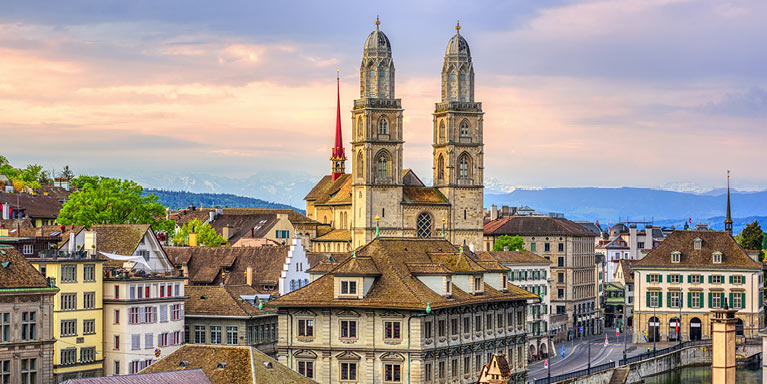
A guide to Switzerland
Our expert view on expat life in a country with a high standard of living

Switzerland is home to modern cities, mountainous landscapes, and some of the world’s most prestigious brands. It offers expats an excellent quality of life and attracts a skilled workforce. There are fantastic opportunities for professionals, particularly those working in the financial services industry.
Expats can earn salaries well above the global average and enjoy a good work-life balance. It’s a safe and stunning place to raise a family, with a superb standard of education and overall infrastructure.
In this guide, we’ll look at the things that are good to know to help you settle quickly into your new life. And, if you’re thinking of moving abroad, we’ll be by your side as you embark on your latest adventure.
- Population: Around 8.7 million
- Currency: Swiss franc (CHF)
- Capital: Bern
- Biggest city: Zurich
- Main language: Swiss German, French, Italian and Romansh
- Main religion: Christianity
- Political system: Federal republic
- International dialling code: +41
- Emergency services: 112 (general), 117 (police), 144 (ambulance), 118 (fire)
- Driving: On the right
-
Careers
Switzerland’s economy has remained stable in recent years with a strong currency, powerful labour market and booming export industry. It’s host to numerous European headquarters and multinational companies, so is a great place to do business – old or new – and expats can earn high wages.
Business is conducted efficiently and transparently; career progress is based on merit rather than connections, with equal opportunities for foreigners and women.
The Swiss value being smart, formal, and punctual. The business structures are hierarchical – managers are expected to lead by example, but decision-making is egalitarian and you’re free to voice your opinions. Respect is earned by hitting deadlines and arriving well prepared. The Swiss like to keep work and their home life separate, so your colleagues might be reluctant to discuss their personal lives.
A firm handshake is the most common business greeting and address senior colleagues by their formal title unless you’re told otherwise. Gifts aren’t expected unless you’re invited to a colleague’s home and then flowers or chocolates are fine.
English is commonly used in business, while German, French and Italian are spoken in their respective regions. Business hours are usually from 8am to 5pm, Monday to Friday.
Education
School is compulsory for children aged between 5 and 15, and the school year runs from September to June. The state-funded schools are free, but classes are taught in the main language of the region. They’re a good option if you plan to settle in Switzerland for the long term or if your children are young enough to become bilingual without too many problems.
Swiss private schools have an excellent reputation with the fees to match – your children will have a more personalised learning experience amongst exceptional facilities. The larger cities with big expat populations also have a selection of international schools, which are great if you only plan to be in the country for a short time and don’t want your children to get behind on the national curriculum of your home country. Competition for places is fierce despite the high fees and waiting lists can be long.
-
Moving money
Putting the right banking arrangements in place is vital for expats around the world. You want to be able to access and transfer money easily, and with a bank you can trust to comply with international regulations. Most people have two banks – one in their home country and one local to where they’re living. But, if your bank has a global network, you may be able to set up an account ahead of your arrival, which gives you time to assess the financial market.
It’s important to understand how foreign exchange works and how fluctuating exchange rates can affect you. When you’re juggling finances in multiple currencies, remember that the currency markets can move quickly and make a big difference to the value of your money.
To help you reduce the risk of fluctuating currency, you could choose a foreign exchange that lets you fix an exchange rate for a fixed period. Then you’ll know exactly how much you need to convert, whatever happens in the market.
Budgeting
When you’re looking to move to a new country, you need to consider how a change in the cost of living could affect your finances. If you’re moving with your job, sometimes your employer may help with expenses, such as accommodation or school fees. Remember to account for setup costs, such as buying furniture and sorting insurance, when you’re thinking about your budget.
Costs
Some of our offshore accounts have a monthly fee, such as the International Current Account, whereas others, like the Premier International Account, don’t. Both offer fee free International Payments (correspondent and recipient bank charges may apply) and 24/7 worldwide access. Plus, the Premier also includes worldwide travel insurance for you and your family, which is underwritten by AWP P&C SA and administered by Allianz Assistance, which is a trading name of AWP Assistance UK Ltd. Eligibility criteria, terms and conditions apply.
Financial planning
While it’s going to be a busy time, it’s also worth setting some time aside to review your financial plans, such as whether you want to open any offshore accounts. They offer the convenience of keeping your money in one place so you can stay with the same bank no matter where life takes you.
Your expat status could give you new opportunities that weren’t available to you at home. However, tax rules differ from country to country, so if you’re unsure about your personal tax obligations, you should seek professional advice.
Lloyds Bank International Private Banking is by your side every step of the journey as you start your new life abroad. We offer international knowledge, experience and dedicated expert support to help meet all your financial needs. From savings to international payments and transfers, we can help you navigate the complex world of wealth management away from home.
Security
Offshore accounts are not protected by the Financial Services Compensation Scheme (FSCS), which protects savings up to £85,000 with authorised UK banks and building societies.
However, our accounts are covered by other schemes. The Jersey Bank Depositor Compensation Scheme, the Isle of Man Depositors’ Compensation Scheme and the Guernsey Banking Deposit Compensation Scheme offer protection for eligible deposits of up to £50,000.
Tax
The complex tax structure has been shaped by the country’s three levels of government – federal, cantonal, and municipal – payable by all residents on worldwide income.
Swiss federal tax law is uniform throughout the country, but each of the 26 cantons has a separate law for cantonal taxes. Municipal taxes are levied as a multiple of cantonal taxes. As tax laws and tax rates vary widely among cantons and among municipalities, your choice of residence is an important decision.
The maximum overall rate of federal income tax is 11.5%; cantonal and municipal taxes are levied at progressive rates, with a maximum combined cantonal and municipal rate of approximately 36%. In addition, cantonal and municipal net wealth taxes are levied, although there are rules for allocating tax liability among the cantons to avoid double taxation.
Individuals establishing tax residence in Switzerland are assessed for federal income tax purposes on a current-year basis. Special rules apply for the first year, but the assessment may be altered if certain extraordinary events substantially change an individual’s financial situation. In general, taxable income for federal tax purposes consists of all types of income earned by a resident individual, including remuneration from an employer; self-employment or business income; pension payments; and compensation for loss of work or ill health; and income from private investments and real estate.
Income from a business, an establishment or real estate located abroad is exempt from taxation, although it must still be recorded on a tax return for the determination of the tax rate.
At the cantonal level, tax is also assessed on a yearly basis, calculated in basically the same way as taxable income for federal taxes. Non-residents are subject to tax on income from Swiss real estate, interest in a Swiss partnership or sole proprietorship, trade, or business attributable to a Swiss permanent establishment or fixed place of business, professional practice or services performed in Switzerland, and payments from Swiss pension funds.
Individuals are considered resident in Switzerland if they stay or intend to stay for longer than one month or work in Switzerland for a period exceeding 30 days.
The Federal Tax Administration (FTA) is responsible for VAT, withholding tax and direct federal tax, and the tax year runs from 1 January to 31 December with tax returns to be filed by 31 March of the following year. See www.estv.admin.ch for further information.
Accommodation
The housing in Switzerland is usually modern, but not especially spacious. Due to the rental costs and rising property prices – the highest in Europe, above 60% higher than the average – you may have to live in an apartment rather than a house. Be warned though, there’s always a lot of competition for accommodation, so if your employer provides housing that’s a huge bonus. Newspapers and property brochures are a good place to start and the sooner the better (before you leave and then you can visit estate agents once you’ve arrived).
To secure a property, you’ll usually need to put down a deposit of up to three months’ rent and provide bank statements and personal references.
Zurich and Geneva are popular destinations, but prices are inflated because of that and by a shortage of rental properties. They would be the easiest places to settle as they’re multicultural, attract plenty of expats and most people speak English. Basel is small and beautiful, packed with history and culture. Bern is favoured by the tech savvy although not as lively as other cities.
Lucerne is a quiet place for couples and families to take in the beautiful scenery, but it can get crowded with tourists at certain times of the year. The temperatures can drop to below freezing with snow on the mountains and fog in the low-lying cities – ideal if you enjoy skiing.
Arts
Switzerland has always made great contributions to the worlds of art, literature, architecture and music, as well as attracting creative people during wartime. There are over 1,000 museums around the country and fabulous festivals, such as the Montreux Jazz Festival, the Locarno International Film Festival and Art Basel.
Culture
Everything in Switzerland works efficiently, although some of the rules can seem quite strict. For example, there are restrictions on when you can wash your car and mow your lawn. Swiss people may appear quite formal and reserved at first, but you’ll soon get used to any cultural differences, customs or legal nuances.
Despite there being four official languages (Swiss German, French, Italian and Romansh), the people are very patriotic, with the national flag proudly displayed outside many homes. It’s worth getting to know a few of the basics in each language, if for nothing other than being able to read the signs outside the big cities.
Food
There’s a wide range of cuisine available. There are the traditional dishes that rely heavily on dairy products, such as fondue, raclette or rösti, and then each region has developed its own specialities. As you’d expect, Switzerland has numerous top-class restaurants, such as Cheval Blanc in Basel or the latest Michelin 3-star restaurant Memories in St Gallen.
Of course, Switzerland has been synonymous with quality chocolate since the 18th century and the Swiss are the world's largest chocolate consumers.
Wine is the most popular alcoholic drink in Switzerland and the country has a variety of grapes due to the different climates and types of land used, often dating back to Roman times. The most widespread varieties are the Chasselas, Pinot Noir and Merlot.
Health
Both public and private medical facilities offer a high standard of care in Switzerland. Public hospitals are clean and modern, with short waiting times, and most staff can speak English. Medical insurance is compulsory for all residents, and even the basic government medical insurance covers most standard procedures. This is deducted at source from your salary. State healthcare then works on an excess system – you’ll pay a minimum of the first 300 CHF (273 GBP or 348 USD) of any medical expenses each year (no charge for children under 18).
For extra treatment, such as dentistry or if you want a private room, you’ll need private insurance at an additional cost for bills above this excess. Private hospitals and clinics offer even shorter waiting times and specialist services, but it costs a lot more and it’s worth checking you’re fully covered before committing to any appointments.
In 2024, the average monthly premium for adults over 26 is 397.20 CHF (360.86 GBP or 460.83 USD). If you’re under 26, the premiums are lower at around 300.60 CHF (273.31 GBP or 348.76 USD) per month.
Pharmacies can be found across the country, with some open 24/7. Medicines that aren’t immediately available can be ordered.
Emergency medical services are covered by a separate compulsory Accident Insurance Scheme (UVG), also deducted from your salary. Ambulances are well equipped, and the staff are highly trained.
Pets
You can bring most pets into Switzerland. Cats and dogs need microchips, rabies vaccinations (at least 30 days prior to entry and not more than a year old) and animal health permits from the Federal Vet Office. A European Pet Passport serves as a certificate of health and must be issued by a licensed vet. Dogs must also be registered at a vet within 10 days of arrival, and you can’t import more than five pets in total.
Restricted items
The list of prohibited items in Switzerland is fairly standard – guns, drugs, counterfeit goods, species-protected plants and animals.
Shipping
Shipping goods to Switzerland is simple and cost effective. However, as it’s landlocked, it can take quite a long time. If everything has been used already, it can be imported duty free. To help speed up the process, you can fill in the documents supplied by most decent removal firms. Transporting your personal effects by air is expensive, but much quicker.
Transport
Switzerland has one of the world’s best transport systems. There are domestic flights connecting the big cities, but it’s often quicker and more cost effective to catch a train. The rail network is extensive and efficient, covering not only most of Switzerland, but also parts of France, Germany, and Italy. There’s at least one train every hour on all routes. You must buy a ticket at a station kiosk or online before you board.
Buses are less popular in Switzerland, although intercity buses connect the larger cities. Tickets can be bought online, with a smartphone app or at a bus station.
If you’re driving on the superbly maintained roads, be warned that speed limits are strictly enforced, and you need to buy a pass online to use the motorways. Another consideration is the icy conditions in winter – most local cars come with snow tyres.
Lloyds Bank International takes no responsibility for the accuracy of this information. It is provided for orientation purposes and to stimulate further research, not as advice. We advise that you independently verify any details and make decisions based on your own assessment. It is crucial you are aware of and comply with any relevant laws in your host country or country of origin.

Geneva
Situated alongside Lake Geneva, it’s the byword for international diplomacy – as the number of international organisations based in this compact city attests to. It’s equally celebrated for its opera as for being a centre of global finance.

Zurich
Situated between wooded hills and within a short distance of the Alps, Switzerland’s biggest city is home to numerous banks and financial institutions. Zurich’s picturesque old town is a labyrinth of narrow, winding streets stretching along the Limmat, which flows from the perfectly clear lake. It also offers state-of-the-art amenities that have contributed to it being recognised for its high standard of living.